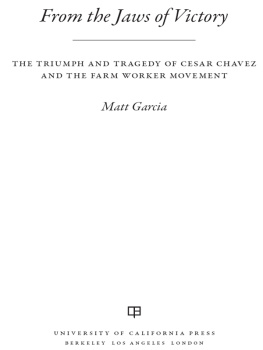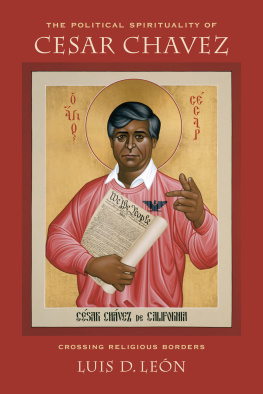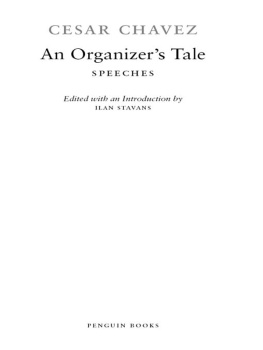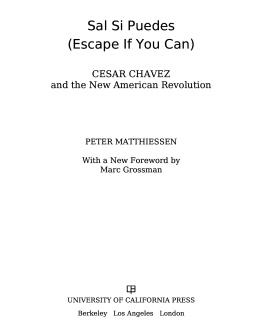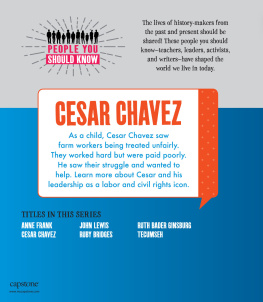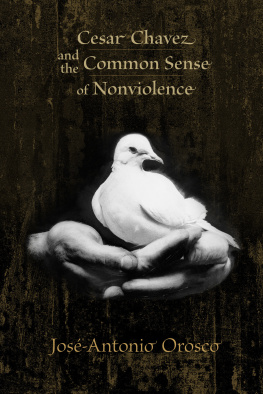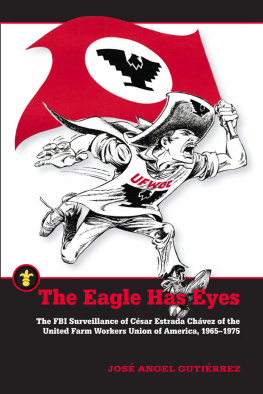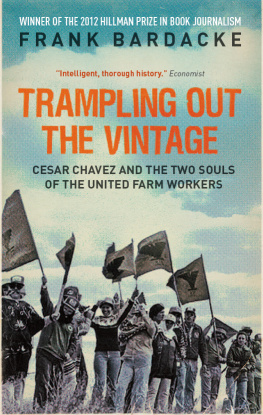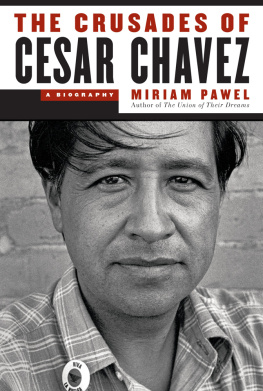
From the Jaws of Victory
The publisher gratefully acknowledges the generous support of the Humanities Endowment Fund of the University of California Press Foundation.
From the Jaws of Victory

THE TRIUMPH AND TRAGEDY OF CESAR CHAVEZ AND THE FARM WORKER MOVEMENT
Matt Garcia

UNIVERSITY OF CALIFORNIA PRESS
BERKELEY LOS ANGELES LONDON
University of California Press, one of the most distinguished university presses in the United States, enriches lives around the world by advancing scholarship in the humanities, social sciences, and natural sciences. Its activities are supported by the UC Press Foundation and by philanthropic contributions from individuals and institutions. For more information, visit www.ucpress.edu.
University of California Press
Berkeley and Los Angeles, California
University of California Press, Ltd.
London, England
2012 by The Regents of the University of California
Library of Congress Cataloging-in-Publication Data
Garcia, Matt.
From the jaws of victory : the triumph and tragedy of Cesar Chavez and the farm worker movement / Matt Garcia.
p. cm.
Includes bibliographical references and index.
ISBN 978-0-520-25930-0 (hbk. : alk. paper)
1. Chavez, Cesar, 19271993. 2. United Farm WorkersHistory. 3. Labor leadersUnited StatesBiography. 4. Migrant agricultural laborersLabor unionsUnited StatesHistory. I. Title.
HD6509.C48G37 2012
331.88'13092dc23
2012011880
Manufactured in the United States of America
21 20 19 18 17 16 15 14 13 12
10 9 8 7 6 5 4 3 2 1
In keeping with a commitment to support environmentally responsible and sustainable printing practices, UC Press has printed this book on Rolland Enviro100, a 100% post-consumer fiber paper that is FSC certified, deinked, processed chlorine-free, and manufactured with renewable biogas energy. It is acid-free and EcoLogo certified.
In Memoriam
Tam Ngoc Tran and Peggy Pascoe
For
Timotea
CONTENTS
ILLUSTRATIONS
MAP
FIGURES
ACKNOWLEDGMENTS
To write a book, an author must draw on the support of his friends, family, and colleagues. Fortunately, I have plenty of all three. First, I thank all the veterans of the farm worker movement that made time to be interviewed. Without them, I would not have tried to write this book. Special thanks go to the incredible staff at the Walter P. Reuther Archive of Labor and Urban Affairs at Wayne State University, especially former director Mike Smith, acting director Kathy Schmeling, research archivist William LeFevre, and audiovisual archivists Elizabeth Clemens and Mary Wallace. In spite of budget cuts and various other challenges, they have maintained the UFW Collections and distinguished theirs as the best labor archive in the country. Paul Henggeler, a professor of history at the University of Texas, Pan-American, who passed away before completing his biography of Cesar Chavez, unearthed important audio recordings at Wayne State and laid the foundations for an online archive that has helped many scholars. Miriam Pawel shared documents and ideas while pursuing parallel interests. I also wish to thank Bill Seacrest at the Fresno County Public Library, Polly Armstrong at Special Collections in the Stanford University Library, Gabriella Gray and the staff in UCLAs Special Collections, Neena Sachdeva at the National Archives, and Peter Blodgett at the Huntington Library. Thank you also to the staff at Fresno State Universitys Madden Library, Special Collections; the Beinecke Library, Yale University; Amherst College; the Mandeville Special Collections, University of California, San Diego; and the U.S. Department of Agriculture Library in College Park, Maryland. The independent writer and antiwar activist David Harris donated his personal archive on the United Farm Workers. Michael Sesling and Patrick Emond mobilized the team at Audio Transcription Center to accurately and efficiently transcribe all of my oral histories.
My old friend Karl Jacoby played a crucial role in helping me hone ideas, edit down a long first and second draft, and maneuver through the uncharted waters of publishing a second monograph. My newer friend Don Critchlow played an equally important role in helping me make difficult cuts to the final draft. Madeleine Adams brought her editorial expertise to bear on the final draft, for which I am grateful. Kay Mansfield, the manager of the Program in Agrarian Studies at Yale University, also helped whittle down the first draft. I was fortunate to be a fellow in the nineteenth cohort of agrarian studies in 200910 with Ponciano del Pino Huaman, Yuka Suzuki, and Annu Jalais, all of whom gave me critical feedback. The directors of the program, K. Sivaramakrishnan (Shivi) and Jim Scott, have created an intellectual treasure, and I am grateful for their generosity and guidance. I also benefited from a fellowship at the Cogut Center for the Humanities and a Solomon Grant at Brown University, and a research fellowship at the Huntington Library. Several Brown University students contributed to my research, including two former graduate students and now assistant professors, Mario Sifuentez and Mireya Loza; Alma Carrillo, a public humanities masters graduate; and two summer undergraduate research groups that included Monica Martnez, Sophie Harris, Armando Garcia, Aracely Prez, Stella Klemperer, and Liliana Ornelas (2005) and Jackie Martnez, Adriana Sandoval, Rochelle Garza, Annette Shreibati, Grisel Murillo, and Veronica Cortez (2006). My research assistant and graduate advisee at Arizona State University, Cali Pitchel McCullough, helped track down incomplete endnotes. Thank you too to my new colleagues at Arizona State University who saw the relevance of my work to their goal of building a more inclusive American university.
I appreciate Nelson Lichtenstein and Ralph Armbuster-Sandoval at UC Santa Barbara, Dave Gutirrez and Luis Alvarez at UC San Diego, Alessandro Monsutti at the Graduate Institute in Geneva, Switzerland, Bruce Schulman at Boston University, and Daniel HoSang at the University of Oregon, who hosted me at their campuses while I was still formulating my arguments. I also received helpful feedback from attendees at a colloquium for immigration studies at the Massachusetts Historical Society. Vicki Ruiz has taught me everything I know about this profession and continues to be a source of inspiration and strength. The following friends, family, and colleagues contributed something positive to this project: Peggy Pascoe, Tam Tran, Susan Ferber, Lolly Tran, Mark Padoognpatt, Marilyn Halter, Elpidio Rocha, Jos Alamillo, Anne Martnez, Mike Willard, Matt Delmont, Kariann Akemi Yokota, Bill Deverell, Robert Roy Ritchie, Ed Escobar, Gayle Gullett, Carlos Vlez-Ibaez, Elizabeth Cant, Victor Becerra, Eileen Boris, Dana Frank, Todd Holmes, Melanie DuPuis, Laura Pulido, Howard Winant, Stephanie Birdsall, Giovianna Roz, Steve Velasquez, Magdalena Mieri, Peter Liebhold, Kristine Navarro-McElhaney, Elizabeth Francis, Sarah Heller Steinberg, Marv and Linda Karsten, Mellissa Martnez, my beloved children, Mauricio and Timotea, and my parents, David and Janet Garcia. Two anonymous readers, later made known to meCindy Hahamovitch and David Montejanomade insightful contributions and helped make my arguments much sharper. A final anonymous reader serving on the University of California Press editorial board made helpful, last-minute suggestions. I am eternally grateful to them. Neils Hooper at the University of California Press saw the potential of this book early on, and encouraged me to be more ambitious in the end.
Next page
